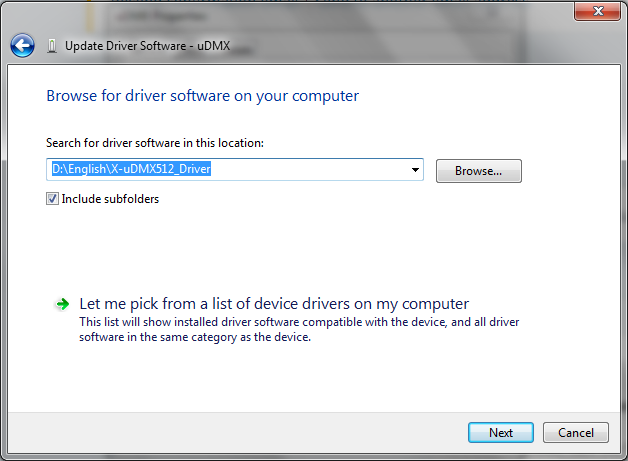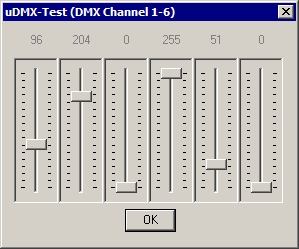Zadig is a Windows application that installs generic USB drivers, such as WinUSB, libusb-win32/libusb0.sys or libusbK, to help you access USB devices.
Click here to continue. Drivers for DMX PIPE and module USB-DMX512 W indows 7, XP, XP x64, Vista, Vista x64, 2000, Server 2003. Download setup executable drivers, next download at: mirror 1. The driver includes files for USB and the library uDMX.dll. The USB-files are always used, uDMX.dll is used depending on the lighting software. As driver installation became more problematic with each newer Windows-version there are several uDMX-drivers that can be installed / tried. LibusbK: all tested programs worked fine. Try this driver first. File Name: udmx-driver-windows-10-64-bit-download.exe Version: 2.4.6 Driver Date: 21 March 2018 File Size: 7,913 KB. I made uDMX working too on Windows 10 The driver to use is: libUSB-win32 v1.2.6.0 The main issue is that driver are not-signed. In order to install them there is a complex method. However, I found a tool named 'Zadig' it helps installing usb driver unsigned.
It can be especially useful for cases where:
- you want to access a device using a libusb-based application
- you want to upgrade a generic USB driver
- you want to access a device using WinUSB
Note:'libusb-based' above means an application that uses either libusb, libusb-win32 or libusbK.
Download
Updated 2020.03.28:
- Zadig 2.5 (4.9 MB)
System Requirements:
Windows 7 or later.
Windows XP and Windows Vista are NO LONGER SUPPORTED.

Usage
Download the executable and run it — no installation is necessary.
If elevation is required, you will be prompted for it.
An usage guide for Zadig is available HERE.
The executable is digitally signed and the signature should state: 'Akeo Consulting'
Frequently Asked Questions (FAQ)
A Zadig FAQ is available HERE.
To provide feedback, report a bug or request an enhancement please use the github issue tracker. Or you can send an e-mail.
License
GNU General Public License (GPL) version 3 or later.
You are free to distribute, modify or even sell the software, insofar as you respect the GPLv3 license.
Zadig is based on libwdi which uses an LGPL version 3 or later license.

The executable is produced in a 100% transparent manner, from its public source, using a Visual Studio environment.
Changelog
- Version 2.5 (2020.03.28)
- Fix
.catgeneration for some user directories with non western characters - Fix update check
- Improve error reporting
- Embedded drivers: WinUSB v6.1.7600.16385, libusb-win32 v1.2.6.0, libusbK v3.0.7.0 & usbser (native)
- Fix
Source Code
- libwdi 1.3.1 source (320 KB). Includes Zadig in the examples directory.
- Alternatively, you can clone the git repository using:
- For more information, see the github project.
Released:
uDMX Interface Library
Project description
Copyright © 2016 by Dave Hocker (AtHomeX10@gmail.com)
Overview
The purpose of this repo is to share what I have learned about programming theAnyma uDMX interface using Python and PyUSB on the Raspberry Pi (RPi). Th Anyma uDMXinterface is relatively inexpensive and there are a large number of clones availablefrom sites like eBay. However, there seems to be a dearth of information available forprogramming this interface under Linux (Raspbian Jessie in this case).
Many thanks go out to Markus Baertschi and the work he did on the uDMX-linux utility(see https://github.com/markusb/uDMX-linux). His C++ based uDMX utility served as the basisfor the majority of my learning exercise.
License
The work presented here is licensed under the GNU General Public License v3 as published by theFree Software Foundation, Inc.. See the LICENSE file for the full text of the license.
Source Code
The full source is maintained on GitHub.
Development Environment
Virtual Environment
This work was originally written in Python 2.7 but has been adapted for both Python 2 and Python 3.Version 1.1.0 works on Python 2. Version 2.0.0 and above works on Python 3.5+.A suitable development environment would use virtualenv and virtualenvwrapper to create a working virtual environment.The requirements.txt file can be used with pip to create the required virtual environment with all dependencies.
Here are some references for setting up virtualenv and virtualenvwrapper.
A quick Internet search will reveal many articles on how to install and setup virtualenv/virtualenvwrapper onmost any OS.
PyUSB
PyUSB requires one of the following: libusb 1.0, libusb 0.1 or OpenUSB. See 5. libusb 1.0 is part of theRaspbian Jessie image available from raspberrypi.org. How toinstall libusb on Windows and macOS is covered below.
Operating Systems
Raspbian
The main purpose of this project was to learn about using the uDMX interface on an RPi. And, this is theprimary environment where the author deploys the code.
macOS
However, enough of the workwas done on OS X 10.11.3 to conclude that this code will work or can be made to work on both OSes. If you want totry it on OS X, use brew to install libusb (it will install libusb 1.0).
Windows
The code has also been tested on Windows 10. To get this to work, you must install a Windows version of libusb.There are likely a number of ways to get a libusb installed.However, the following libusb version has been successfully tested:libusb-win32 using this
installer.The key is to follow the instructions for the 'Driver Install Creator Wizard'. You need to create a driver for theuDMX interface.
Programs and Modules
tryusb.py Program
This was my first learning tool. It does the following:
- Locates the uDMX interface.
- Prints some information about the interface.
- Sends some basic commands to a Venue ThinPar64 demonstrating how to manipulate the light via DMX.
It also helped me resolve some issues with permissions on the RPi. To run this app:
uDMX.py Program
This program functions pretty much like the C++ based uDMX utility from Markus Baertschi. To get help, try
For each invocation, this program does the following:
- Loads the uDMX.conf file from /etc/uDMX.conf.
- Activates the virtualenv defined in the conf file IF PyUSB is not found in the current environment.
- Loads the .uDMXrc file defined in the conf file.
- Locates the uDMX interface based on vendor ID and product ID.
- Sends the DMX message defined by the command line arguments.
uDMX.py uses the pyudmx.py module.
pyudmx.py Module
The pyudmx.py module provides a simple, easy to use module for talking to the uDMX interface. Essentially,it is a uDMX specific adapter on top of the pyusb module. If you want to write a uDMX oriented applicationconsider starting with pyudmx.py.
Simple usage example:
In this example, the open() method will default to opening the first uDMX interfacewith vendor ID 0x16c0 and product ID 0x05dc.

A more complete programming example can be found in the example.py file.
Learning Notes
Here are some notes from this learning exercise using Raspbian Jessie on an Rpi. The lessons learnedhere apply to most Linux systems, but probably do not apply to Windows or macOS.
Finding the uDMX Interface
As there is no kernel driver for the uDMX, it does not show up under /dev like /dev/tty.
You can locate it this way:
The uDMX is the first device at Bus 001, Device 005 with ID 16c0:05dc. The 16c0 is the vendor ID andthe 05dc is the product ID. The uDMX can be found at /dev/bus/usb/001/005.
Permissions
If you want to program the uDMX on a raspberry pi without always running sudo, youmust do something with the default permissions of the uDMX device.
Notice the permissions are: 664. Only root and members of theroot group have write permission. This is why sudo is required for the current user (usually pi).You can fix this issue by changing the permissions on the uDMX to: 666.
Now check the permissions.
Unfortunately, this is only a temporary fix. On the next reboot the permissions will revertback to their default 664. One way to permanently fix this problem is to write audev rule that sets the permissions to 666 when the device is plugged in. Here's therule.
You can take this solution by editing the 98-uDMX-usb.rulesfile and uncommenting the line that contains this rule. Copy the edited file to /etc/udev/rules.d.
To make sure the rule is used, pull the uDMX and replug it.
There is an obvious down side to this solution. It gives all users read/write access to the uDMX. Wecan limit read/write access to members of the pi group by changing the rule to:
This rule leaves the permissions set to 664 while changing the ownership to root:pi.Overall, this is probably more desirable. The root user owns the device, members of thepi group (which includes pi) have read/write access and all other users have read-only access.
You can choose this rule by editing 98-uDMX-usb.rules file and uncommentingthe line that contains this rule.
Symlinks
You can use a udev rule to create a symlink for a uDMX device.
This rule will produce a symlink for each uDMX device found.
Looking at these permissions you might think that there is open access to the uDMX.However, that is not the case. The permissions of the the symlink target prevail.The symlink simply allows all access to the symlink itself.
Thanks to muzzol for this tip.
udev Rules
For more on udev rules see Writing udev rules.
0.9.1 Beta | 2006-02-16 Is Our First Release. It Is A Lot Easier To Build But Has Some Shortcomings…
Reboot Issues
This is an observation. On a warm reboot, the uDMX interface is not always found.You might have to replug the device to get Raspbian to find it. Why this happens is unclear.
Multiple uDMX Issues
It is possible to run multiple uDMX devices on one system, but it can be difficult. Most uDMX interfacesand clones do not have unique serial numbers. This makes identification of each interface problematic.
Given the detailed USB information shown below, the following is available to identifya uDMX.
- Vendor ID
- Product ID
- Manufacturer
- Product
- Serial
- Bus number
- Device number
Based on limited research it appears that only the Bus and Device numbers uniquely identify agiven uDMX interace. The other values are likely to be the same for all uDMX interfaces based on theAnyma design and firmware. Unfortunately, the Bus and Device number cannot be used reliably because simply movinga uDMX to another USB port will change one or both of those values.
If you want to use multiple uDMX interfaces, you need to plug them in one at a time and use the lsusb commandto determine the Bus and Device number for each one. And, after that you can't move them around.
The pyudmx.uDMXDevice.open() method will accept a bus number and device address if you need to manage multipleuDMX interfaces.
Udmx Driver Windows 10 Download
Unless otherwise indicated, the programs in this repo will work with the first uDMX interface they find.
Detailed USB Information
Here is a dump of innformation a uDMX clone. Most of the information in the dump seems to refer tothe firmware manufacturer not the hardware manufacturer. The firmware is open source.
References
Release historyRelease notifications | RSS feed
2.0.0
Udmx Usb Driver Download
1.1.1
Download files
Download the file for your platform. If you're not sure which to choose, learn more about installing packages.
'Usb-dmx512 Udmx Driver' | TextUploader.com
| Filename, size | File type | Python version | Upload date | Hashes |
|---|---|---|---|---|
| Filename, size udmx_pyusb-2.0.0-py3-none-any.whl (9.0 kB) | File type Wheel | Python version py3 | Upload date | Hashes |
| Filename, size udmx-pyusb-2.0.0.tar.gz (22.3 kB) | File type Source | Python version None | Upload date | Hashes |
Hashes for udmx_pyusb-2.0.0-py3-none-any.whl
DMX Interfaces - Support Forum
| Algorithm | Hash digest |
|---|---|
| SHA256 | 3d0bdb5acbfd7eb2f6ac4f3d13d08b89260454d4c9a97088db13819e9e5391a8 |
| MD5 | 106b338f572e7dfc03930a85cadaef2c |
| BLAKE2-256 | 4a1dc19a32186ef78ee67180cc01ad57264d3ddd7da2c675947b0451317adbc8 |
Hashes for udmx-pyusb-2.0.0.tar.gz
Cached
| Algorithm | Hash digest |
|---|---|
| SHA256 | 3ed45facbbab6c49d6218a04eb44377b21022415f79cce9e271d489ed6d7c263 |
| MD5 | 20d2cbea27e92aeab41df00d26ee6e86 |
| BLAKE2-256 | 81b2e392e233b6b798b5fa4cd717d7adff1d24bda52302673215abd844ecf4fe |